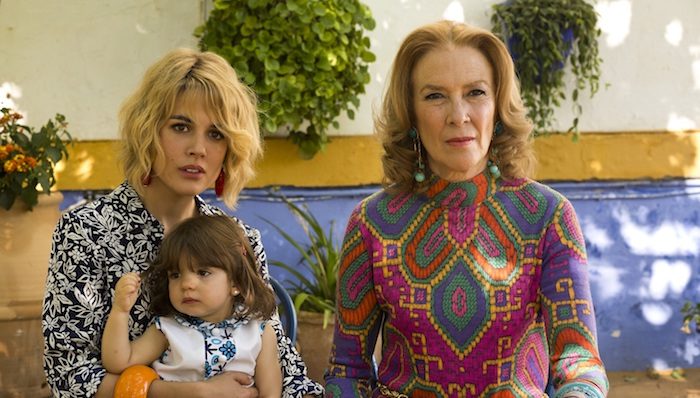VOD film review: Julieta
Review Overview
Sumptuous colours
8.5Stunning performances
9Spellbinding direction
9.5Matthew Turner | On 26, Dec 2016
Director: Pedro Almodovar
Cast: Emma Suarez, Adriana Ugarte, Daniel Grao, Inma Cuesta
Certificate: 15
After flying the friendly skies of high camp in I’m So Excited (2013) and delivering stylishly creepy chills with The Skin I Live In (2011), Spanish maestro Pedro Almodovar makes a welcome return to female-focused emotional drama with his 20th feature, Julieta, adapted from three short stories by Canadian author Alice Munro. The result is the director’s best work since Volver.
Emma Suarez (whose presence provides a welcome blast of nostalgia for fans of 90s Spanish cinema) plays Julieta, a middle-aged woman who’s preparing to leave Madrid and relocate to Portugal with her partner, Lorenzo (Dario Grandinetti from Talk to Her). However, a chance encounter on the street sends shockwaves of guilt coursing through Julieta, as she’s forcibly reminded of the estranged daughter she hasn’t seen in nearly 15 years.
Reeling from the news that her daughter is not only still alive but now has a family of her own, Julieta cancels her plans with Lorenzo and begins writing a confessional letter to her daughter. This triggers a series of flashbacks in which the younger Julieta (now played by a spiky-haired Adriana Ugarte) becomes pregnant after a sexual encounter with a man she meets on a train (Daniel Grao as Xoan) and subsequently marries him, raising their young daughter, Antia, in his picturesque fishing village. However, when tragedy strikes, events are set in motion that will push mother and daughter apart.
This is a story drenched in guilt, a gut-wrenchingly emotional mystery that unfolds slowly, teasing out the details in exquisitely agonising fashion, since we can plainly see the devastating effect of the past 15 years in the older Julieta’s haunted reaction.
As with previous films, such as Live Flesh, Almodovar’s tale may have a literary origin, but he makes it very much his own, weaving in all his familiar trademarks, from the use of his de facto repertory company to his sumptuous use of colour and allusions to both his own work (Ugarte’s Julieta could have walked right out of one of Almodovar’s 1980s work) and classic Hollywood women’s pictures.
There’s a strong flavour of Hitchcock running throughout the film, from a pair of charged encounters on a train to Alberto Iglesias’ very Bernard Hermann-esque score and a cheeky riff on Rebecca, as Julieta moves in with recently widowed Xoan, under the disapproving eye of his sinister house-keeper (Almodovar favourite Rossy de Palma in a comedy fright wig).
Hitchcock would certainly have approved of Almodovar’s master-stroke, a gasp-inducing transition shot (cleverly referenced in the film’s poster) in which Ugarte is having her hair dried and when the towel comes up, Suarez has taken her place. Even though they don’t particularly look alike, the conceit of having two different actresses play the same part has a powerful emotional effect; it’s as if the tragedy literally makes Julieta a different person.
The performances are stunning: Suarez radiates so much guilt and pain that it becomes heart-breaking to look at her, while relative newcomer Ugarte makes a striking impression as the younger, impulsive Julieta, whose entire story is also deeply rooted in guilt, stemming from a separate encounter on that fateful train right before she meets Xoan. In addition, there’s strong support from Grandinetti (who’s as much in the dark as we are about Julieta’s past) and from Cuesta, as a local artist specialising in erotic pottery, who’s suspiciously close to Xoan.
A beautifully made, superbly acted and powerfully emotional drama, Julieta is one of the best films of the year, and worthy of a place alongside Almodovar’s greatest work.



















